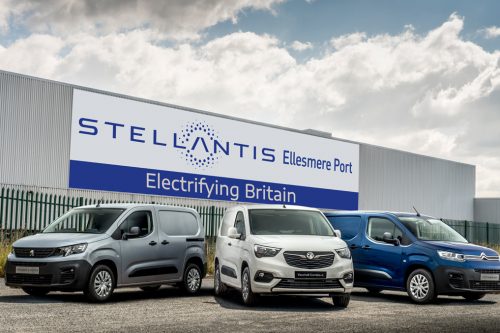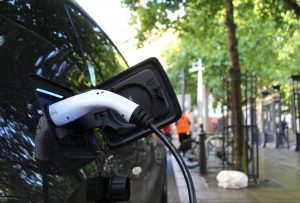Stellantis Cheshire site escapes closure axe, at the expense of Luton colleagues

The Stellantis electric van production site at Ellesmere Port, and its 1,100 jobs, have been saved from the axe.
The car manufacturer has announced plans to close its van production site in Luton, with the loss of more than 1,000 jobs, and switch production the Cheshire plant, which was previously the home of the Vauxhall Astra.
It said hundreds of jobs from the Bedfordshire plant could be transferred to Ellesmere Port, and that it will invest a further £50m into the Cheshire plant, linked to the proposed increase in output.
In July 2021 Ellesmere Port’s future was guaranteed, for the time being, when Stellantis announced investment of £100m, including £30m from the Government, to switch to electric van production.
But the site has been under increasing pressure over the past year as Stellantis warned it could have to axe manufacturing capacity as the demand for electric vehicles (EVs) has not matched forecasts.
In September this year the Society of Motor Manufacturers and Traders revealed that just 16% of UK vehicle sales were EVs.
And motor manufacturers face stringent government regulations on EV sales in a bid to convince consumers to switch from conventional vehicles to electric.
Regulations state that fully electric cars, and not hybrids, must make up 22% of all manufacturers’ car sales and 10% of car sales, with the percentage increasing each year.
For every sale outside the mandate, firms must pay a £15,000 fine.
Stellantis managing director, Maria Grazia Davino, said at an industry event in June: “The fact is that demand is not there.”
Unite Union said the move to close Luton was a “complete slap in the face” for its members.
Following the Stellantis announcement, and pressure from motor industry leaders, Business Secretary Jonathan Reynolds said the Government would consult on changes to EV sales rules, because they are not working as intended, he said.
The Luton plant currently builds petrol and diesel vans and had been due to start making a medium-sized Vivaro electric van from 2025, before the decision to close it.
Van production will transfer to Ellesmere Port, while production of all conventional vans will be transferred to France when the plant closes in spring next year.
Stellantis said it is now consulting with workers and unions in Luton.
It said: “Whilst strengthening Ellesmere Port as its sustainable LCV hub in the UK with the transfer of Luton operations, Stellantis remains committed to acting responsibly toward its employees in Luton and, if the company proposal is approved, will offer relocation support to facilitate employees wishing to transfer to the Ellesmere Port site with an attractive package, where hundreds of permanent jobs will be created.”
Dr Jonathan Owens, senior lecturer in operations and supply chain management at the University of Salford, said: “The zero emissions vehicle (ZEV) mandate is having an impact on automotive manufacturers manufacturing here in the UK and is forcing them into a strategic review of their business model, focusing on their manufacturing footprint.
“The news from Stellantis to close its Luton factory is a result of the company’s strategic review and the ZEV impact on its business model. This year, UK automotive manufacturers have been mandated to increase electric vehicle (EV) sales to 22% of their total UK new car sales, if they do not, they receive a £15,000 penalty for every combustion-engine car sold over.
“Subsequently, along with the October budget that significantly impacted business in general, this was the last straw for Stellantis. This follows Ford last week, which also announced to cut 800 UK jobs.”
He added: “Other UK automotive manufacturers may soon be reviewing their manufacturing footprint as the UK ZEV mandate becomes more of a hindrance than help for strategic growth. We must consider that UK automotive manufacturers are predominantly multinational with considerable capacity elsewhere and can relocate, leaving behind empty factories.
“Growth in demand for new electric cars has flatlined. In 2023 EV’s sales peaked, however, the market share did not increase.

“This was the first time EVs failed to increase their market share since 2018. The UK Government phased out incentives to buy EVs in 2022 and all that remains is the 12 months zero vehicle excise duty. However, this is soon to be reviewed to be fairer for drivers with combustible engines. Also, to add to this, the cost of electricity has become more expensive.
“An EV is still considered a new technology by many consumers, and it is still more expensive to buy than a combustible engine vehicle. Whilst the range has been increasing, one of the main concerns potential customers share centres on charging away from home.
“UK Government figures indicate just before the current government came into power, there were a little over 64.6 thousand public charging devices available in the UK. Of which only 19% represented the desired quick chargers that many consumers who charge away from home would prefer to have available.
“While ChargePoint numbers are increasing, this needs to accelerate further to align support with the ZEV mandate for manufacturer’s targets, which will also support consumer confidence to buy into the market since there is no longer as much incentive to buy an EV.”








